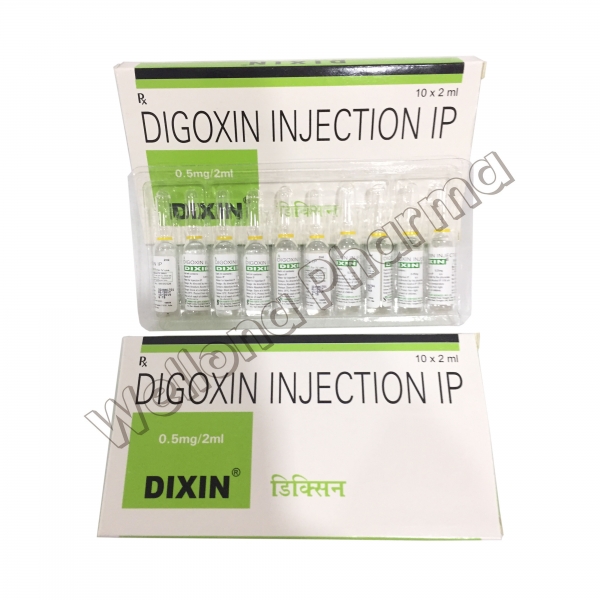


What is Digoxin?
Digoxin or Lanoxin Injection is used for the Treatment of heart failure in adults, Treatment of atrial fibrillation in adults, and other conditions. Digoxin Injection may also be used for purposes not listed in this medication guide.
Digoxin Injection contains Digoxin as an active ingredient.
Digoxin Injection works by increasing the availability of intracellular calcium.
Digoxin Injection Uses
Digoxin Injection is used for the treatment, control, prevention, & improvement of the following diseases, conditions and symptoms:
· Treatment of heart failure in adults
· Treatment of atrial fibrillation in adults
Digoxin Injection - Side-effects
The following is a list of possible side-effects that may occur from all constituting ingredients of Digoxin Injection. This is not a comprehensive list. These side-effects are possible, but do not always occur. Some of the side-effects may be rare but serious. Consult your doctor if you observe any of the following side-effects, especially if they do not go away.
· Cardiac toxicity
· Nausea
· Vomiting
· Abdominal pain
· Intestinal ischemia
· Hemorrhagic necrosis of the intestines
· Headache
· Weakness
· Dizziness
· Apathy
Digoxin Injection Working, Mechanism of Action and Pharmacology
Digoxin Injection improves the patient's condition by performing the following functions:
· Increasing the availability of intracellular calcium.
Digoxin Injection - Precautions & How to Use
Before using Digoxin Injection, inform your doctor about your current list of medications, over the counter products (e.g. vitamins, herbal supplements, etc.), allergies, pre-existing diseases, and current health conditions (e.g. pregnancy, upcoming surgery, etc.). Some health conditions may make you more susceptible to the side-effects of the drug. Take as directed by your doctor or follow the direction printed on the product insert. Dosage is based on your condition. Tell your doctor if your condition persists or worsens. Important counseling points are listed below.
· Altered response in thyroid disorders and hypermetabolic states
· Blood tests are necessary to ensure that digoxin dose is appropriate
· Contact doctor if experiencing nausea, vomiting, persistent diarrhea, confusion, weakness, or visual disturbances, which indicate digoxin toxicity
· Monitor and record heart rate and blood pressure daily
· Reduced efficacy in patients with hypocalcemia
· Risk of decreased cardiac output in patients with preserved left ventricular systolic function
· Risk of digoxin toxicity as shown by cardiac arrhythmias, anorexia, nausea, vomiting, visual changes
· Risk of ischemia in patients with acute myocardial infarction
· Risk of severe sinus bradycardia or sino-atrial block
· Risk of vasoconstriction in patients with myocarditis
